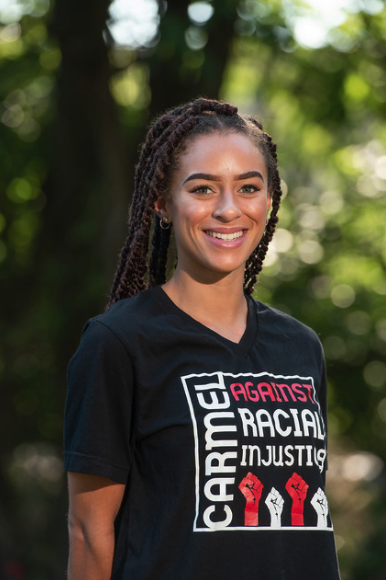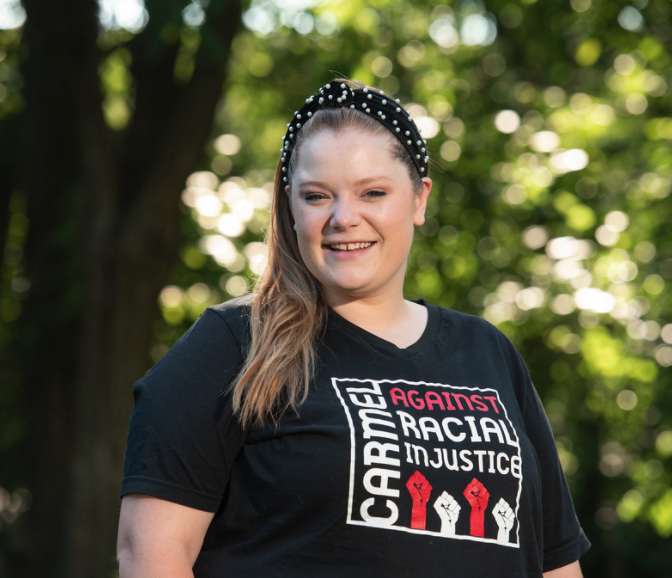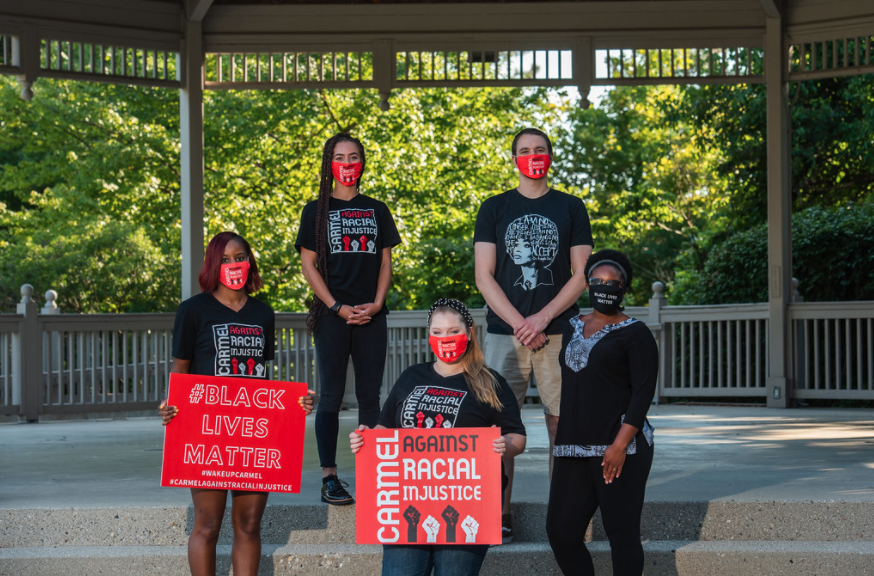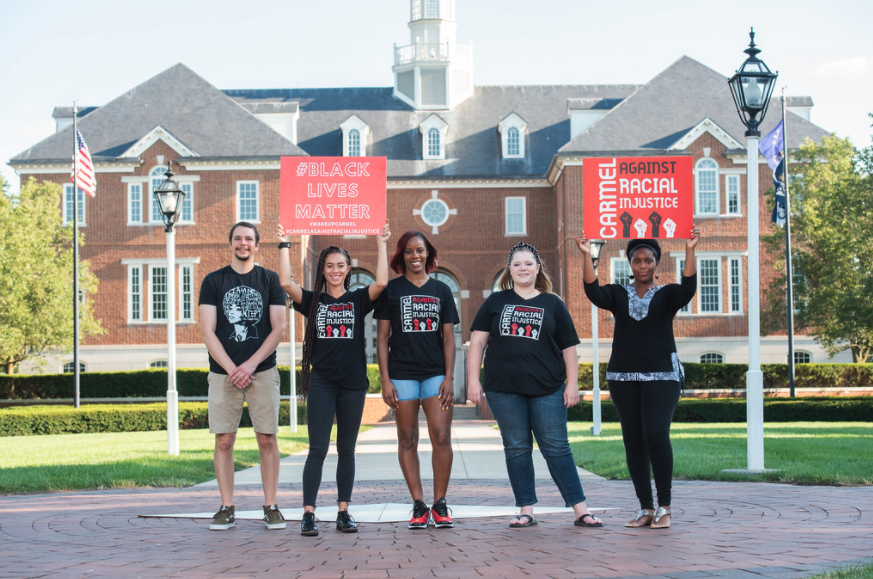Carmel Against Racial Injustice Seeks Change in Schools, Community & Policing
Photography Provided by Amy Payne & CARI
 Following the tragic death of George Floyd, communities across the country united to demand real and lasting change regarding racial equality. In June, Ashten Spilker, a 2014 graduate of HSE, proudly displayed a #BlackLivesMatter (BLM) sign in her Carmel front yard. When the sign was vandalized, she posted a video to social media acknowledging her frustration.
Following the tragic death of George Floyd, communities across the country united to demand real and lasting change regarding racial equality. In June, Ashten Spilker, a 2014 graduate of HSE, proudly displayed a #BlackLivesMatter (BLM) sign in her Carmel front yard. When the sign was vandalized, she posted a video to social media acknowledging her frustration.
“I wanted to do a protest, but as a white person, I didn’t think it was my place to take that step,” says Spilker, who works as a behavioral therapist in the Special Education Department at HSE.
When two of her former classmates (also ’14 HSE grads), Breanna Hargrove and Kayla Seymour, saw Spilker’s video, they reached out and within five days they mobilized a plan to hold a Sit-In Against Racial Injustice at the gazebo in Carmel. They expected to draw a crowd of 50. Instead, 500 people showed up to show their support.
“Everyone was asking, ‘What can I do? How can I help?’” says Hargrove, a respiratory therapist.
As the crowd shared stories, it became clear that many people of color did not feel welcome in the community. That’s when the trio knew they had to do more. And since there was no organization in Carmel that was dedicated to such work, Hargrove, Seymour and Spilker launched Carmel Against Racial Injustice (CARI) and quickly assembled a passionate 24-member team all dedicated to the mission of invoking change in schools, in policing and in the community as it relates to racial justice.
CARI, which will soon be an official 501(c)3, has created three different petitions people can sign: one for the city, one for the school district and one for the police department.
CARI is pushing for changes in the school district to protect students and make them feel safe. They want to see a knowledgeable chief equity officer hired in Carmel Clay Schools who can give direction from the top-down about introducing racial equality initiatives in all school improvement plans. They want a better process in place for students being able to report racial incidents at school. In addition, they want to see more diverse teachers and counselors hired at Carmel High School. Such changes could impact academic performance. According to Spilker, 38% of black students pass ISTEP compared to 70% of white students.

“Black students are underperforming [perhaps because] they have to deal with racial abuse while still going to school,” Spilker says. “Black students are expected to shoulder so much more and perform in the same way.”
Hargrove is disheartened that the same issues she faced seven years ago at school are still around today.
“Students should be able to go to school without hearing racist remarks by their teachers, classmates or walking down the hallway,” says Hargrove, who believes that black history month should be taught year-round. “Sometimes I was the only black person in my classes. This is a school of 4,000 students. When you’re not exposed to different races and cultures, it makes it easier for you to have prejudices or biased tendencies.”
As for the BLM movement, unfortunately sometimes people hop on board because it’s the trendy thing to do. That’s not the reason to get involved, according to CARI. If you’re genuinely interested in creating change, however, the founders of CARI suggest you start by cracking open a book. The CARI team recommends “White Fragility” and “How to Be an Antiracist.” They also list additional book recommendations on their Facebook page that are written by Black authors who are experts in their field.
“There’s a fine line between asking the opinion of a person of color and expecting them to educate us on racism because it’s not their job,” Spilker adds. “It’s our job to educate ourselves.”
For those who counter the BLM movement with the proclamation, “#AllLivesMatter,” Spilker explains that it’s not about stating that one race is superior to another.
 “Yes, all lives matter. No one is saying that they don’t, but the whole concept is that all lives can’t matter if Black lives don’t matter,” says Spilker, who uses the analogy of how silly it would be if someone’s house is on fire and you went outside while everybody was trying to put out the fire on that house and cried, “What about my house? My house matters, too!”
“Yes, all lives matter. No one is saying that they don’t, but the whole concept is that all lives can’t matter if Black lives don’t matter,” says Spilker, who uses the analogy of how silly it would be if someone’s house is on fire and you went outside while everybody was trying to put out the fire on that house and cried, “What about my house? My house matters, too!”
“Obviously your house matters,” Spilker adds. “But your house isn’t the one on fire and you just look silly trying to get everyone to put the fire out on your house when there is no fire there.”
The CARI team recognizes that Black people are struggling due to a broken system. White privilege means that when the work gets too heavy, white people have the luxury of being able to take a break from it.
“I can turn off my phone, turn on the TV and not think about it. Black people don’t have that ability because they live it,” Spilker says. “And it’s important to note that their skin color is not the problem. It’s the system that’s the problem. We [white people] built the system. It’s our job to dismantle it.”
Moving forward, the group plans to continue organizing events and peaceful protests to effect change. CARI has organized several walks for equity so far, including its latest event in August — “Walk For Equity In Education.”
For more information on CARI, you can find them on Facebook or visit them online at stopracialinjustice.wixsite.com/carmel.






